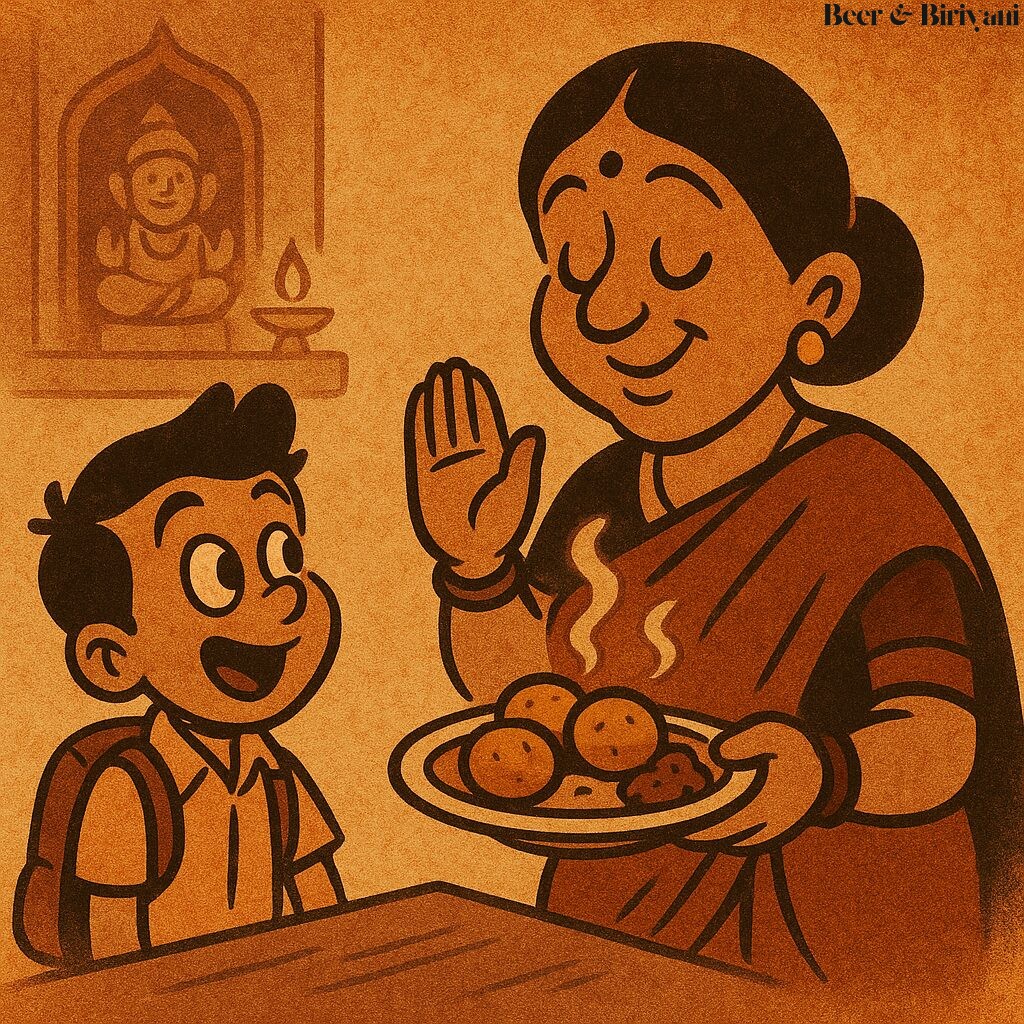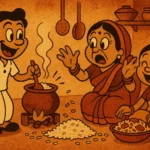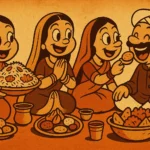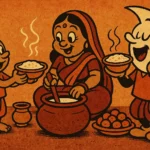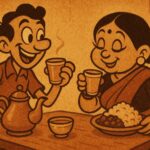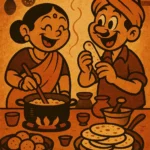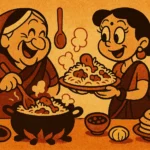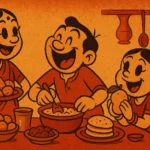The Pooja and the Sacred Start
The morning pooja is a sacred part of the day. It’s not just a religious act; it’s a moment of stillness that prepares you for what comes next. In the morning, everything is quieter, simpler. The house is still sleepy, but there’s something powerful in the silence of those early hours. After lighting incense, offering flowers, and saying a prayer, there’s a brief sense of peace that settles over the house. It’s the kind of calm that primes you for the bustle ahead, but in those few minutes, the world can feel timeless, like everything is happening at the right pace. It’s in this quietness that the most important meal of the day begins.
Breakfast in Indian homes, particularly those rooted in tradition, has a rhythm that begins with pooja. You can’t skip it. There’s an understanding that after prayer comes the ritual of feeding the body. That’s where the magic of breakfast happens—right after the pooja is done, and just before the world wakes up fully. For us kids, it was an almost *imperative* part of the day: pooja, followed by breakfast, and then school, in that exact order.
But why breakfast? Why is it that the simplest meal of the day takes on such importance in Indian households? Part of it is the connection between nourishment for the body and nourishment for the soul. The act of praying first creates a sense of grounding, and then you’re ready to fuel your day with something hearty and wholesome. That’s why breakfast has always been made with care: whether it’s soft idlis, spicy upma, or a paratha stuffed with spiced potatoes. The variety changes, but the essence remains the same: food to start the day with intention.
The Importance of Timing
In many Indian homes, the timing of breakfast is essential. There’s a certain rhythm to it, a flow that must be followed. You can’t just eat whenever you feel like it. No, breakfast is like an orchestra, with pooja acting as the conductor, setting the tempo for everything that follows. Once pooja is done, you know it’s time to eat—no distractions, no delays. The food is prepared and served with purpose, often by the mother or grandmother, who knows exactly when to bring it to the table to match the timing of everything else.
This doesn’t mean that breakfast has to be fancy. On some days, it’s as simple as a bowl of porridge or some fresh fruit, but it’s always on time, and it’s always made with care. The act of eating at the right moment, of taking in the first nourishment of the day, is almost as significant as the meal itself. In this context, breakfast is both a ritual and a physical necessity. It’s when the mind, body, and soul align before the day begins. That’s why, even if you’re late for school or work, breakfast always has to come first. It’s like a small ceremony before the chaos of the day starts to unfold.
The Family Breakfast Table
In an Indian home, the breakfast table is a place of family connection. In my childhood home, no one ever ate breakfast alone. My siblings, parents, and sometimes even extended family would gather together. The table was filled with dishes: poha, paratha, dosa, eggs, and always a pot of chai. It was a moment when everyone sat together to catch up, talk about the day ahead, and share laughter before everyone went their separate ways. Breakfast wasn’t just a meal—it was an experience. It was a bonding time.
Now, in Austin, I miss that sense of community at breakfast time. Though I’ve adapted to my quieter mornings, there’s still a part of me that longs for that table full of chatter, where chai was poured generously, and every conversation seemed to start with the food in front of us. There’s something inherently comforting about the family breakfast tradition. It’s a small, quiet time that ensures you start the day with love, connection, and nourishment.
Why Timing and Ritual Matter
The timing of breakfast in Indian homes isn’t just about getting food into the body; it’s about honoring the flow of the day and the rhythm that comes with it. Breakfast is symbolic of the transition from rest to activity, from sleep to productivity. By marking that transition with pooja and food, we set the tone for the day ahead. There’s a kind of sacredness in these daily rituals that is often overlooked in the fast-paced, on-the-go world we live in today. The pooja and breakfast ritual reminds us to pause, reflect, and then move forward with purpose.
In Austin, I’ve learned that while the rituals may change, the need for grounding in the morning remains constant. Whether it’s my morning chai or the quiet minutes spent in prayer, I find that the ritual of food and timing anchors my day, just as it did back home. The world may move faster now, and the routines may be different, but the connection to food, to culture, and to the timeless rhythm of life remains the same.
Food as the Anchor of the Everyday
Breakfast, in its simplest form, is more than just a meal. In Indian culture, it is the moment when we align our bodies, minds, and spirits for the day ahead. It is the time when the pooja sets the stage, and the food nourishes and strengthens us for whatever comes next. The sacredness of breakfast—the careful timing, the ritual of pooja, and the food shared among family—reminds us that no matter where life takes us, these small, daily rituals anchor us to what truly matters. And in those moments, food becomes more than sustenance. It becomes a bridge between the past, present, and future, connecting us to our roots and to the rhythm of our everyday lives.
Born in Mumbai, now stir-frying feelings in Texas. Writes about food, memory, and the messy magic in between — mostly to stay hungry, sometimes just to stay sane.

